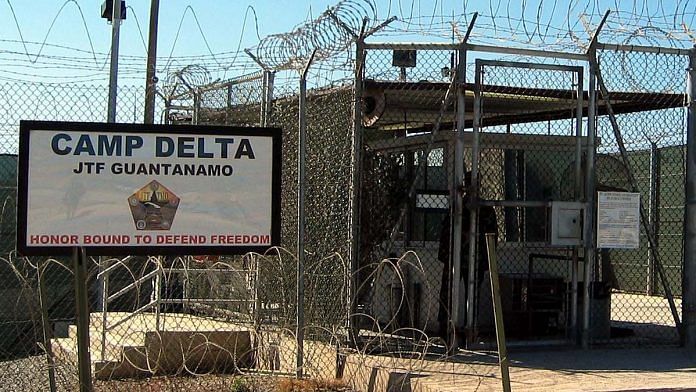New Delhi: The last Afghan national held in the Guantanamo Bay military detention facility has been released by the United States in a prisoner exchange, the Taliban regime’s foreign ministry deputy spokesperson Hafiz Zia Ahmad announced Monday.
Former Taliban commander Haji Bashar Noorzai was released in return for Mark Frerichs, an American civil engineer and aid worker kidnapped by the Taliban in 2020.
Noorzai, a one-time Taliban commander, had been convicted of smuggling heroin to finance the jihadist group’s operations, and was sentenced to a life term in 2009.
Following his arrival in Kabul, Noorzai briefly addressed a press conference alongside the Taliban’s foreign minister, Amir Khan Mutaqqi, where he said, “I am proud to be in the capital of my country alongside my brothers.”
The Taliban had been demanding Noorzai’s release since 2020, soon after it signed a peace agreement with the United States.
At least 780 prisoners, including 221 Afghan nationals, are known to have been held in the infamous prison on terrorism charges after the 9/11 incident, although most were never tried for their alleged offences. From 2014, the United States freed several high-ranking Taliban leaders.
Frerichs was taken hostage in January 2020, and a video of him pleading for help was released later.
Also Read: Judge says US held Afghan man ‘unlawfully’ at Guantanamo Bay, paves way for his release
The Taliban druglord
Following his arrest in 2005, prosecutors alleged that Noorzai had used revenues from smuggling heroin into the United States to purchase assault rifles, grenade launchers, and anti-tank weapons for the Taliban. The ethnic Pashtun warlord, who lived with his wife and 13 children in Pakistan’s Quetta, is believed to have joined the Taliban in 1994, as the jihadist group first emerged in Afghanistan.
In return for funds, the Taliban allowed Noorzai to run a network that collected opium from small farmers in southern Afghanistan, process it into heroin, and transport it for sale in the United States and Europe, prosecutors said.
The druglord, the United States claimed, in turn profited from the advance knowledge of the imposition of an opium ban by Taliban authorities in 2000, which allowed him to build stockpiles that could be sold for high prices. The profits were invested in a network of properties in the United Arab Emirates and Pakistan.
Following the 9/11 incident, Noorzai is alleged to have used his resources to provide the Taliban with fighters to wage a battle against the United States. Later, however, he switched sides, surrendered to the United States after the collapse of the Taliban regime, and handed over 15 truckloads of weapons, including several hundred anti-aircraft missiles. Noorzai is said to have had a long-standing relationship with the Central Intelligence Agency (CIA), helping them in tracking down missing Stinger anti-aircraft missiles that were provided to the anti-Soviet Union Mujahideen.
Lawyers for Noorzai claimed that he also held a series of meetings with Federal Bureau of Investigation (FBI) officials in Pakistan and Dubai, who sought information about the Taliban’s financial dealings. He was also claimed to have brokered the surrender of former Taliban foreign minister Wakil Ahmad Mutawakil.
The druglord was lured to a meeting in New York in 2005 and then arrested by the Drug Enforcement Agency on charges of importing $50 million worth of heroin into the country.
(Edited by Siddarth Muralidharan)
Also Read: How US’ war on terror became a war in court — my 13 trips to Guantanamo Bay



